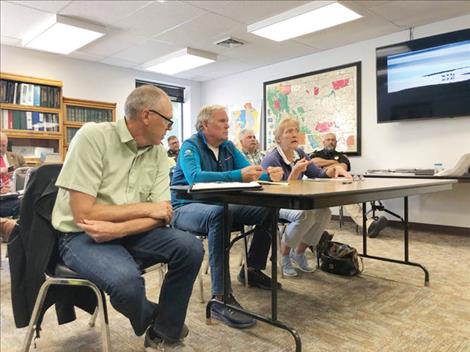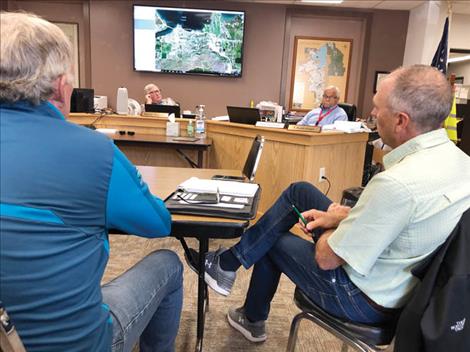Legislators meet with county commissioners regarding traffic, districting, other issues
Hey savvy news reader! Thanks for choosing local.
You are now reading
1 of 3 free articles.
LAKE COUNTY – Four Lake County legislators met with county commissioners last Tuesday to discuss a laundry list of concerns, ranging from an over-crowded jail and traffic congestion to redistricting and frustration with the local office of the Department of Revenue.
State Senators Greg Hertz, Bob Keenan and Dan Salomon and Rep. Linda Reksten spent nearly two hours with commissioners and several department heads in the monthly confab.
Legislators opened the meeting with a request that commissioners write a letter to the Montana Districting and Apportionment Commission, urging the five-member board to keep the former boundaries of Montana’s western congressional district relatively intact. The state was given a second seat in the U.S. House of Representatives after exceeding the one million mark in the 2020 census.
The commission, established by the Montana Constitution, is charged with drawing new political boundaries for federal and state legislative districts every 10 years, using population data from the most recent census. Montana’s two House districts must have similar population numbers and, ideally, share common interests.
“Some of the maps we’re seeing now would take Lincoln and Flathead counties and push them east and pull Bozeman and Gallatin County west,” said Sen. Hertz. While such an arrangement might be more balanced politically, “I don’t think that’s what’s important to the people of Montana.”
Instead, he argued, western Montanans have more in common than residents of eastern Montana, and should be allowed to stay in the same congressional district.
Commissioners were urged to submit a letter by Sept. 15 since the goal is to make a final decision by late October on congressional redistricting before moving on to redrawing legislative maps.
Commissioner Bill Barron shifted the conversation to traffic congestion in Polson, and lamented that rebuilding the highway through town is low on the Department of Transportation’s list of priorities. “That’s unacceptable,” he said. “Traffic has a stranglehold on Polson right now.”
As an interim measure, county and city officials have discussed ways to improve Seventh Avenue, and possibly connect it to a second access to Cougar Ridge that developer Mike Maddy is required to build. An east-west thoroughfare could serve as “an alternate route through Polson for locals and take the burden off Hwy. 93” he suggested, until the highway is widened.
Legislators asked commissioners to present a cost estimate at their next joint meeting. “I think you can make a really good case for a grant since this isn’t going to cost nearly as much as the others,” said Sen. Salomon, referring to multi-million-dollar construction projects eventually slated for Ronan and the Ninepipe area.
On another issue, commissioner Dave Decker complained about ongoing issues with the local office of the Department of Revenue, especially when it comes to the complicated matter of moving taxable property off the tax rolls and into trust for the Tribes. Legislators promised to discuss the issue with the new department director, who Keenan characterized as being “all about customer service.”
County treasurer Robin Vert-Rubel told legislators that the long lines for motor vehicle registration, which had forced her office to scale back its hours this summer, have receded, and the office is once again open 8 a.m.-5 p.m. weekdays. “We’re pretty much back to normal,” she said.
Barron added that the Tribes are talking about contracting with the state to provide vehicle registration for tribal members. “That would be a big help to us,” he added, since an estimated 25% of the vehicle registrations in Lake County are for tribal members.
The commissioners also discussed their ongoing frustration with lack of reimbursement for Public Law 280, which gives the state criminal jurisdiction over Native Americans involved in felonies. The Legislature passed a law in 2017 allowing Lake County to pull out of the agreement and shift felony jurisdiction back to the federal government, but Gov. Steve Bullock vetoed the bill.
Barron, a former county sheriff, told legislators that enforcement is costly. “We don’t want out of it, we just want the state to step up to the plate and take some responsibility for paying for it,” he said.
Barron also mentioned that he meets with Tribal Chairwoman Shelly Fyant at least twice a month in an ongoing exchange about common interests, including law enforcement. The Tribes may consider prosecuting minor felonies committed by tribal members, he said, “but even that would be a five-year process.”
Sheriff Don Bell was on hand, along with two deputies, who discussed the upswing in drug use and overdoses in Lake County. “For a long time, it was just meth,” said one officer. “Now it’s heroine, meth, fentanyl and cocaine.”
Among the state’s most populous counties, he noted that Lake County leads the pack in terms of per capita drug offenses, and is “almost double” the next county on the list, which is Yellowstone. It ranks no. 2 in violent crimes and no. 6 in drug crimes.
Bell said those statistics show, in part, “that law enforcement is very active here,” but added that their efforts to control crime are hampered by an inadequate jail.
“I’d like to figure out funding for a jail,” he said. “We turn away no less than 20 felony warrants a week. We run a maxed-out facility.”
Barron suggested that it might be time to consider a regional facility.
Salomon, a Ronan dairy farmer, took the commissioners to task for their letter of intent to quit assessing fees for irrigation districts served by the Flathead Indian Irrigation Project (the move was tabled after a public meeting Aug. 30).
“Irrigators are trying to put together a plan where they have significant say in how the project is operated,” he said. “Just to screw it up and throw a monkey wrench in it is not doing the residents of Lake County any favors.”
Commissioner Gale Decker brought up his frustration with the Department of Justice, which hasn’t responded to repeated requests for guidance on how to interpret the county’s responsibilities under the new Montana Water Rights Protection Act. Until they hear from the Attorney General, the county is refusing to replace infrastructure such as bridges that cross irrigation canals, and takes the position that those duties now fall to the Bureau of Indian Affairs.
“We just want a response,” he said. “I have trouble spending taxpayer dollars to replace someone else’s infrastructure.”
Barron asked if there was any way to include commissioners’ input in future agreements forged between the state and local tribal governments. “When counties have problems with tribes it’s because of some agreement the state made and commissioners were never at the table,” he said. “It makes us look like we’re anti-tribe and that’s just not the way it is.”
Legislators and commissioners alike wrapped up the meeting with to-do lists, and agreed to meet again Oct. 5. “I want us to feel like we’re moving forward with long-term and short-term goals,” said Rep. Reksten, who helped facilitate the monthly gathering.

















